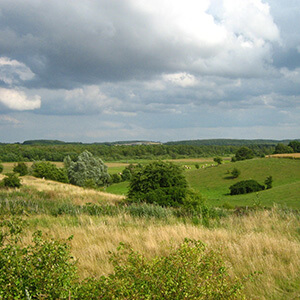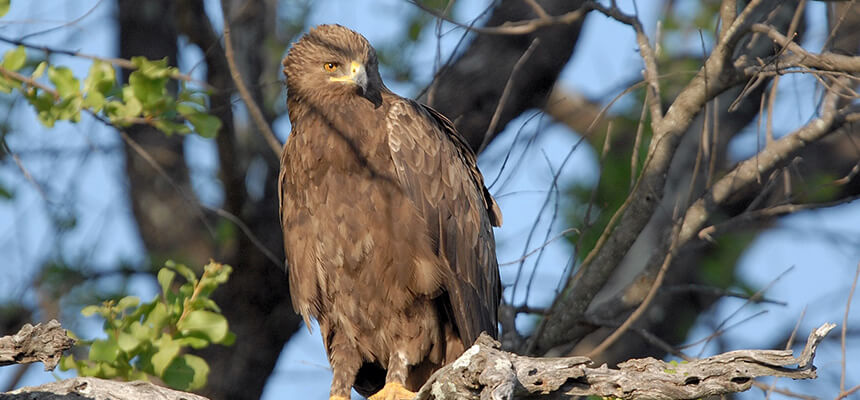 Abandoned roosts and eagles going extinct
Abandoned roosts and eagles going extinct
Meadows for the last of Germany’s lesser spotted eagles
About 100 pairs of lesser spotted eagles still live in Germany. For decades the number of pairs living and breeding in this country has been declining. In the year 2000 there were still 130 pairs breeding in Mecklenburg-Vorpommern, Brandenburg and Saxony-Anhalt. In the meantime, this small species of eagle is considered extinct in Saxony-Anhalt. And even in their last refuges they are threatened: to build their nests, lesser spotted eagles require mature and high trees in near-natural and undisturbed forests. The commercial exploitation of woodlands including the felling of trees in their prime results in these eagles not finding appropriate trees to build nests in. And one other factor contributes to the decline in lesser spotted eagles in Germany: to find enough food for themselves and their chicks, these rare birds need to have meadows close to their roosts where they can hunt for small prey such as mice, moles or frogs. The eagle will only find enough food in extensively farmed wet meadows free of pesticides and artificial fertilisers. Conventional herbicides and fertilisers not only repel pests, but also the majority of the prey so vital to the lesser spotted eagles.
Necessity
Food-rich meadows for the endangered lesser spotted eagle.
Activity
The NABU Foundation buy up bio diverse meadows close to the roosts of lesser spotted eagles in order to maintain their basic food resource in the long term.
Countable effort
Buying one square metre per received donation.
Result
The long-term availability of extensively and eagle-friendly farmed meadows allows the lesser spotted eagle to breed successfully.
Systemic effect
The lesser spotted eagle is to have sufficient hunting and breeding grounds far into the future. Extinction of the species in Germany is to be avoided.
Background
Bio divers and vibrant meadows are becoming increasingly rare. To raise their young successfully, lesser spotted eagles need to have enough food within a three-kilometre radius. The conversion of extensively farmed meadows close to lesser spotted eagle roosts into ploughed fields has resulted in these sensitive birds not being able to feed their young and eventually leaving their roosts for good.
Systematically converting from abandoned fields and meadows into intensively cultivated land or pastures is a major reason for the decline in the population in north eastern Germany in recent years. In other places, the lesser spotted eagle has been having a hard time finding adequate breeding and hunting grounds for much longer.
The good deed
There are still a few pairs of the endangered lesser spotted eagles in the Recknitz valley. In order for them to successfully breed and hunt here, we will buy up meadows in the immediate surroundings of the roosts and maintain them as bio diverse grasslands. Owned by us, the meadows will be safe from intensive farming, allowing the eagles to continue to breed here in the future.
Challenge
Buying and maintaining protected areas requires legal, organisational and nature conservation expertise. Years of experience help us to carry out the individual steps such as sales negotiations, notarial handling of the transaction as well as integrating the newly acquired land in our professional conservation-focussed land management as effectively as possible.

AboutGermany
Berlin
Capital
81 413 100
Number of inhabitants
40 952 USD
Gross domestic product per capita per year
6
Human Development Index
Germany is very densely populated. The large extensively farmed and little disturbed areas with meadows and old woodlands that the lesser spotted eagle needs have become rare.
About the organization and further information
Association
NABU Foundation for National Natural Heritage
Transparency International




